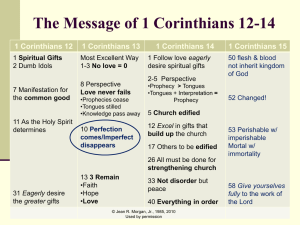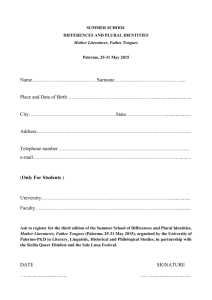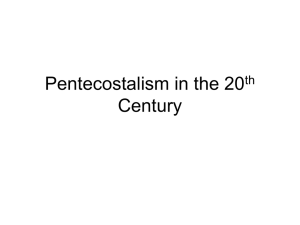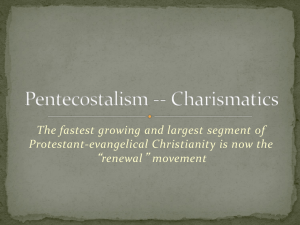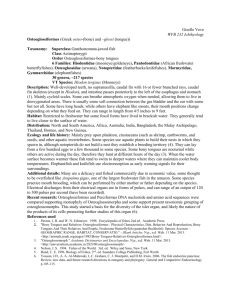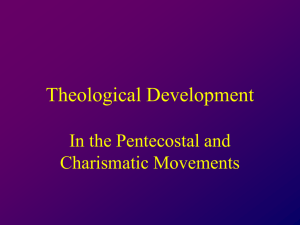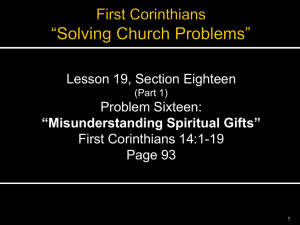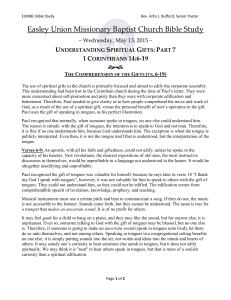The Pentecostal Movement in the 20th Century
advertisement
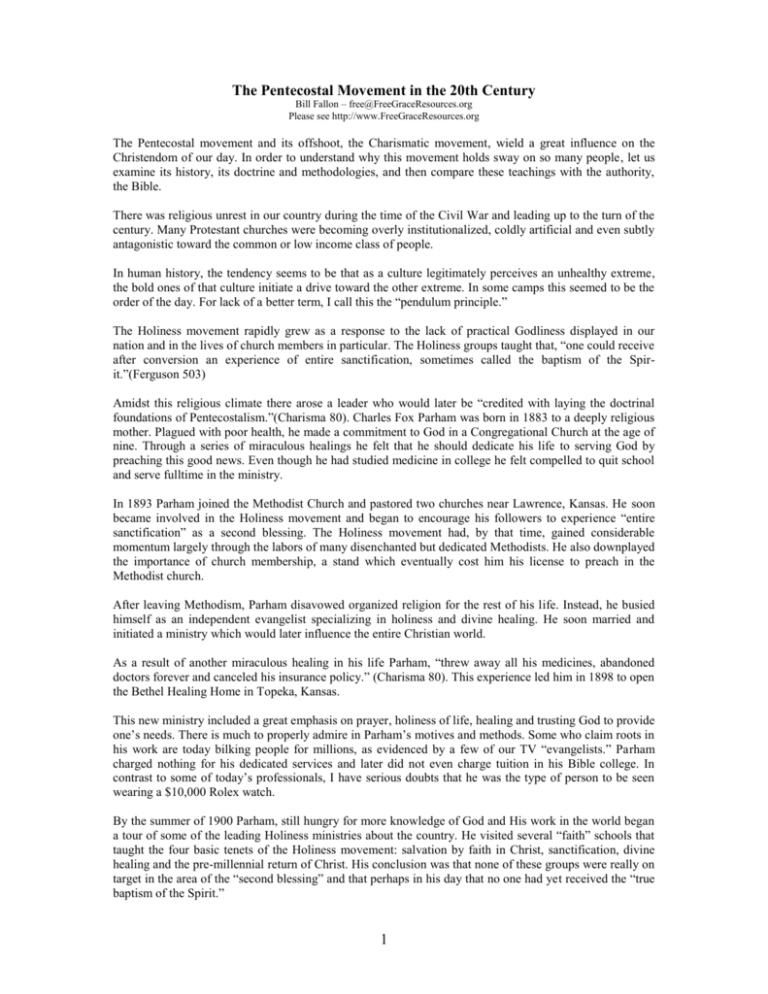
The Pentecostal Movement in the 20th Century Bill Fallon – free@FreeGraceResources.org Please see http://www.FreeGraceResources.org The Pentecostal movement and its offshoot, the Charismatic movement, wield a great influence on the Christendom of our day. In order to understand why this movement holds sway on so many people, let us examine its history, its doctrine and methodologies, and then compare these teachings with the authority, the Bible. There was religious unrest in our country during the time of the Civil War and leading up to the turn of the century. Many Protestant churches were becoming overly institutionalized, coldly artificial and even subtly antagonistic toward the common or low income class of people. In human history, the tendency seems to be that as a culture legitimately perceives an unhealthy extreme, the bold ones of that culture initiate a drive toward the other extreme. In some camps this seemed to be the order of the day. For lack of a better term, I call this the “pendulum principle.” The Holiness movement rapidly grew as a response to the lack of practical Godliness displayed in our nation and in the lives of church members in particular. The Holiness groups taught that, “one could receive after conversion an experience of entire sanctification, sometimes called the baptism of the Spirit.”(Ferguson 503) Amidst this religious climate there arose a leader who would later be “credited with laying the doctrinal foundations of Pentecostalism.”(Charisma 80). Charles Fox Parham was born in 1883 to a deeply religious mother. Plagued with poor health, he made a commitment to God in a Congregational Church at the age of nine. Through a series of miraculous healings he felt that he should dedicate his life to serving God by preaching this good news. Even though he had studied medicine in college he felt compelled to quit school and serve fulltime in the ministry. In 1893 Parham joined the Methodist Church and pastored two churches near Lawrence, Kansas. He soon became involved in the Holiness movement and began to encourage his followers to experience “entire sanctification” as a second blessing. The Holiness movement had, by that time, gained considerable momentum largely through the labors of many disenchanted but dedicated Methodists. He also downplayed the importance of church membership, a stand which eventually cost him his license to preach in the Methodist church. After leaving Methodism, Parham disavowed organized religion for the rest of his life. Instead, he busied himself as an independent evangelist specializing in holiness and divine healing. He soon married and initiated a ministry which would later influence the entire Christian world. As a result of another miraculous healing in his life Parham, “threw away all his medicines, abandoned doctors forever and canceled his insurance policy.” (Charisma 80). This experience led him in 1898 to open the Bethel Healing Home in Topeka, Kansas. This new ministry included a great emphasis on prayer, holiness of life, healing and trusting God to provide one’s needs. There is much to properly admire in Parham’s motives and methods. Some who claim roots in his work are today bilking people for millions, as evidenced by a few of our TV “evangelists.” Parham charged nothing for his dedicated services and later did not even charge tuition in his Bible college. In contrast to some of today’s professionals, I have serious doubts that he was the type of person to be seen wearing a $10,000 Rolex watch. By the summer of 1900 Parham, still hungry for more knowledge of God and His work in the world began a tour of some of the leading Holiness ministries about the country. He visited several “faith” schools that taught the four basic tenets of the Holiness movement: salvation by faith in Christ, sanctification, divine healing and the pre-millennial return of Christ. His conclusion was that none of these groups were really on target in the area of the “second blessing” and that perhaps in his day that no one had yet received the “true baptism of the Spirit.” 1 In October of 1901, Parham obtained a large unfinished mansion that he would remodel and use for his Bible college. This school was named, the “College of Bethel” and was also run on faith. Later, during an organized prayer vigil, one of the students saw a vision “of a vast lake above the building about to overflow, containing enough to satisfy every thirsty soul.” (Charisma 81) This was later seen as a prophecy of the Pentecostal outpouring that came about two months later. Parham had been concerned with the differing views as to how to receive the second blessing, the evidences of it and even the prevalent view that many of the gifts of the Spirit are not for us today. The matter came to a head during the last days of December when he gave his students an unusual homework assignment. Since he was scheduled to preach in an out-of-town church over the weekend, he instructed his class: “The gifts are in the Holy Spirit, and with the baptism of the Holy Spirit, the gifts, as well as the graces, should be manifested. Now, students while I am gone, see if there is not some evidence given of the baptism so there may be no doubt on the subject.”(Charisma 83). When he returned on December the 30th, the verdict was unanimous. The report was that even though different things had occurred when the Pentecostal blessing fell, they felt that the indisputable proof on each occasion was that they spoke in tongues. Parham instructed them to fast and pray night and day until the restoration of Pentecostal power came on them. Thus the evening of December 31 st was charged with the spirit of expectancy. On the first day of the twentieth century, while some in the city were waking from hangovers, the seekers continued in prayer in the Upper Room (the third floor prayer room). Later in the day a 30 year old student, Agnes Ozman, came to Parham and requested the laying on of hands so that she might receive the Holy Spirit and the apostolic sign of speaking in tongues. She testifies, “As he prayed and layed (sic) hands upon my head, I began to speak in tongues, glorifying God. Bless Him! I talked in several languages, for it was manifested when a dialect was spoken. Glory to God.”(Charisma 85). Parham later stated that she began speaking Chinese and that she was unable to speak or write in English for three days and that she even wrote in Chinese. During the next several days most of the students claimed similar experiences. On January 3rd, Parham claims that 12 of the students were praising God in tongues and singing “Jesus, Lover of My soul in six different languages. He then received the evidence of tongues and states, “I began to worship God in the Swedish tongue which later changed to other languages and continued so until morning.”(Charisma 85). The significance of this event to Parham lay in the belief that tongues were known languages which the Lord would give to missionaries for use in evangelizing foreign lands. This was further confirmed in his mind as linguists, foreigners and other visitors to Bethel College later confirmed “that at least 20 languages were perfectly spoken and understood.” (Charisma 85). The school soon folded due to lack of funds and facilities but Parham continued to preach throughout the Midwest this experience of which Agnes Ozman had become the prototype. In 1905 he started a second Bible college in Houston, Texas. One of his students there was a Negro Holiness preacher named William J. Seymour, who soon led the Azusa Street revival in Los Angeles from which Pentecostalism rapidly spread throughout the world. The following are some reasons for the rapid growth of early Pentecostalism as presented by Gary Nonemacher during a Florida Bible College class on the Charismatic Movement: 1. The groundwork had been laid by the Holiness movement—the seeking of more evangelical fervency and personal involvement in religious matters. 2. Emphasis on experience and not doctrine. 3. No emphasis on establishment of Pentecostal churches. No competition or perceived threat to the mainline churches. 4. Tailored mostly to poor people who were unacceptable in the mainline churches. 5. They did not wait for people to come to them, they went out and got them. 6. Mass meetings, singing, healings, displays of emotion, spiritual pep rallies. People came and got swept away. 2 7. 8. 9. 10. 11. 12. 13. 14. The use of women as pastors, and meeting leaders. They did not feel bound by Bible principles in this area. At that time there was a large group of disenchanted women who sought more rights and more recognition. This began before women could even legally vote in America. They had a strong separate stance from worldliness. They preached against worldliness, immorality, etc. They encouraged the use of musical instruments, catchy new tunes, hand clapping, etc. There was a contagious atmosphere of happy excited people. They were not trying to change the culture. They did not try to save the world but tried to save individuals out of the world. The attitude of early leaders was very sacrificial. They did not try to build a kingdom for themselves. The emphasis was on faith, not method. That encouraged individual ministry. They practiced the starting of indigenous churches; works not networks. There was not a lot of structure, no doctrinal statements. Experience was the important thing. The practice of having no doctrinal statements later caused problems as there was no vehicle for control. They came on the scene at a time of general spiritual lethargy and helped to fill a gap. “The greatest growth for Pentecostal churches came after World War II. With more mobility and greater prosperity, Pentecostals began to move into the middle class and to lose their image of being disinherited members of the lower classes. The emergence of healing evangelists such as Oral Roberts and Jack Coe in the 1950’s brought greater acceptance to the movement. The TV ministry of Roberts also brought Pentecostalism into the homes of the average American. The founding of the Full Gospel Business Men in 1948 brought the Pentecostal message to a whole new class of middle-class professional and business men, helping further to change the image of the movement.” (Ferguson 838). The more recent emergence of satellite TV and the profusion of slick sounding “TV evangelists” has since multiplied this impact many times over. This phenomenon has no doubt had a major impact in the ubiquitous nature of the more recent Charismatic movement. The Charismatic influence has permeated almost every major denomination. According to the January 1991, issue of Charisma magazine, there are now “no less than 372 million Pentecostal and charismatic believers in the world. These are divided in 14,000 Pentecostal and charismatic denominations serving more than a million churches and prayer groups, making up over 20 percent of all Christians.” I cannot in any way verify the accuracy of that estimate as some of the mentioned churches do not publish membership numbers and it was not stated in the article the criteria used to determine if one was to be counted. Whatever the accurate figure might be, we can be assured that the number could be considered formidable. Why would other segments of evangelical Christianity be concerned about this movement? Should we not rejoice if someone is drawn closer to God? Let us examine some of the major doctrines in light of the Scriptures. Though there are numerous splinter groups that would fly the Pentecostal banner, most would stand firm on several common doctrines. They are unanimous concerning the fact that the Bible is the word of God. But we would take issue concerning the practical application of that statement. One area is that many believe that God is still adding to His revelation through modern-day prophets; the word of wisdom and the like. Revelation 22:18-19 pronounces some pretty severe judgment upon those who would add to God’s finished revelation. Even if that verse were not there, a red flag should go up in our mind when someone claims a message from God and it contradicts the message that He has already written to us. Another side of the same issue is that though the claim is to believe the Bible, many times experience takes precedence over God’s word. Experience and emotions, though valuable and God-given, can be deceitful and cannot be depended upon when in conflict with the sure authority of the Bible. Satan is the master counterfeiter and II Corinthians 11:15 tells us that his ministers are ministers of righteousness. He can certainly deceive well-meaning people with that method. I am convinced that Satan is quite content to let us have a good feeling about worshiping God just as long as we actually do not worship Him. We must always interpret our experience by the Bible, not the Bible by our experience. Even though the roots of the movement are Arminian, almost all adhere to salvation by belief in Christ, with many believing in eternal security. I have encountered individuals who claim to be Charismatics and 3 dogmatically affirm that the evidence of the Baptism of the Holy Spirit is speaking in tongues, an experience which they claim. Some of these same then state that they are trusting in Christ plus good works for their salvation. How can they have the Holy Spirit and be trusting a false gospel for their salvation? This illustration is not typical but has happened to me a number of times. Another common thread seems to be the claims that the Pentecostal gifts are intended for all believers today. Usually it is stated that all of the apostolic signs and gifts of Acts 2 and I Corinthians 12-14 are for us, but in practice a few are emphasized. The most prevalent is the gift of tongues. This is usually taught to be the evidence of the Baptism of the Holy Spirit and is thought to be confirmation of rank of spirituality and power in one’s life. Usually, in everyday practice the tongues issue is frequently in the forefront. Whether between two charismatics or a charismatic and a non-charismatic, the issue usually turns to the “haves and the havenots.” Since much is usually said about “tongues,” let us say some more: It is first necessary to gain an accurate definition of key words or terms. The word “tongues” in the New Testament comes from the Greek word “Glossa” (). The meaning is quite similar to our English word “tongue.” It means either “the organ of speech” or “a language.” The context determines which of these two meanings is meant. The majority of times that it is used in the New Testament it is clearly referring to a language. It is unfortunate that the King James translators rendered “glossa” as tongues. The result has been that today when we hear the word “tongues” we react much as Pavlov’s dogs and automatically “salivate” toward the meaning of ecstatic speech. This often passes for Biblical tongues but it neither fits the definition of the word nor the Bible description. Even if we were to heed the exhortation of Paul and some Charismatics to “forbid not to speak with tongues,” it would not relate to much of the Charismatic movement of today as the modern-day phenomena that we now see is not the tongues of the Bible. The most complete Bible description of tongues is found in the second chapter of Acts (I Corinthians 14 defines its use, misuse and importance). There we find the apostles waiting in Jerusalem for the Promise of the Father, His Holy Spirit (Acts 1:4, 5). When they were filled with the Holy Spirit they began to speak with other tongues as the Spirit gave them utterance (2:4). The Jews from other nations heard them speak in their own language (2:7). Several nations are mentioned by name and residents of these nations even heard them speak in their own dialects (). Nonsensical jibber-jabber does not have language subgroups or dialects. In all the places that tongues are mentioned in the New Testament, I can find no references to indicate that it is referring to anything different than a known language that may or may not have been miraculously acquired. The thirteenth chapter of I Corinthians contains a verse that pertains to the issue of tongues for today. Chapter 13 is often called the “Love Chapter” and treated parenthetically. It is frequently isolated from the context and therefore, spoken of as a separate entity from the previous chapters depicting the myriad of problems in the Church at Corinth. I do not believe that this chapter is a “petunia in an onion patch.” The sharp contrast between chapter thirteen and the previous chapters exists for a purpose. I believe that, among other things, God is trying to tell us that the church had a big problem with divisions, immorality, carnality, litigation between believers, improper attitudes about marriage and singleness, defilement of Christian liberty, improprieties at the Lord’s table, and abuses of Spirit gifts, etc. These problems could be partially rectified by the application of divine love in our lives, or more accurately, the proper use of the gifts, in love, for the edification of the body. It appears that, if the context is considered, that chapter fourteen should not primarily be called the “tongues” chapter. Chapter twelve describes the gifts; as various. Chapter thirteen dictates how to apply them; in love. Chapter fourteen gives us the purpose of the gifts; for edification of the Body of Christ. Tongues are an exception as they are the least of the gifts and are for a sign. Let us read on to see about the permanence of tongues. The first seven verses of chapter thirteen give us a Godly perspective of divine love. This is the same love that was manifested toward us when God sent His Son that we might live (I John 4:9). It is also the same love that we are to display to others in fulfillment of the law (Romans 13:8, 10). This is an enduring love. 4 That is the emphasis of verse eight. The force of the verse is not about the gifts. The comparison is being made of the temporary quality of the gifts and the permanence of divine love. Divine love never fails. However, it is significant that some of the gifts are temporary, especially in view of the Charismatic doctrines concerning the gifts of the Holy Spirit. Verse 8 reads: “Love never fails. But whether there are prophecies, they will fail; whether there are tongues, they will cease; whether there is knowledge, it will vanish away.” The words “they will fail” speaking of prophecies and “it will vanish away” speaking of knowledge, are identical in the Greek except that one refers to a plural noun and one to a singular noun. The word comes from “katargeo” (). It means to “abolish” or to “render ineffective.” It is here in the future tense and in the passive voice which means that it will not perform the action of the verb itself but the noun will have the action of the verb done to or upon it by an external force. There is a significant and distinct difference in how God’s Holy Spirit describes the termination of tongues. The words “they will cease” speaking of tongues is a different word and in a different mood than the previous mentioned definition. The word is “pauo” (). It means to “stop” or to “cease.” In this verse it is in the future tense and in the middle voice. The middle voice means that the noun is acting upon itself with the action of the verb. In other words, tongues will not be forced to stop because of an external force or event but it will cease of itself. In God’s mind there apparently is a need for prophecy and knowledge until “that which is perfect” has come but when that time arrives, there will no longer be a need for tongues. In this context, it is probably referring to the gifts of prophecy and knowledge. Verses nine and ten mention that we know in part and prophesy in part until that which is perfect has come. At that time these two will be “done away.” This is the same word that was used in verse eight in reference to knowledge and prophecy. Notice that, in contrast to knowledge and prophecy, tongues are not mentioned again. At this time they would have stopped of themselves. Though we know that tongues will cease of themselves and that it will be accomplished before the time that that which is perfect has come and prophecy and knowledge will be abolished, we do not know from this verse alone when tongues will stop or maybe have already stopped. Very likely “that which is perfect” is speaking of the completed revelation of God, the Bible. We know that the signs, wonders, miracles, and gifts of the Holy Spirit was God bearing witness before the New Testament was completed (Hebrews 2:4; II Corinthians 12:12) The miracles seemed to be substantiative in nature. After the Bible was completed, both they and we no longer need wonders to authoritatively say, “Thus says the Lord.” It is now in written form for people to see for themselves. If this interpretation is correct then the gifts of prophecy and knowledge have also been abolished. We see a relative abundance of miracles starting at Pentecost and for a time afterwards. Just before His ascension Jesus told His apostles that they would receive power after the Holy Spirit came upon them and that they would be witnesses to Him (Acts 1:8). Not only was Jesus’ early work confirmed by signs and wonders (Acts 2:22; John 20:30), but the apostles were also confirmed in this manner (Acts 2:43; 5:12; 8:13; 14:3; Romans 15:19; II Corinthians 12:12; Hebrews 2:4). The apostles’ work was to be foundational in function. Ephesians 2:20 tells us that the mystery, the church which is His body (Ephesians 1:22, 23) was built on the foundation which was the apostles and prophets, Jesus Christ Himself being the chief cornerstone. It goes on to say that in Christ we are being built together for a habitation of God. Peter, using the same allegory, tells us that we “as living stones, are being built up a spiritual house” (I Peter 2:5). The point is that the foundation is laid only once. The process of construction then turns toward the superstructure. The foundation cannot be built again and again. The primary need for the apostles ended when the church started to be established. The church is now exhorted to be led by godly elders who, in turn, will exhort and edify the body from God’s word (I Tim. 3:1-7; Titus 1:5-9). There is a glaring absence of apostolic succession and confirmation by signs and wonders. This is also historically true even in the accounts of Acts. For example, early on in Paul’s ministry we see signs, healings (another important teaching of the Charismatics) etc. But later we see him not being healed 5 of his own infirmity (II Corinthians 12:7-10), telling Timothy to take a little wine for his stomach’s sake and his frequent illnesses, (I Timothy 5:23), and leaving Trophemus sick at Miletum (II Timothy 4:20). It appears that he could also do little for his beloved co-worker, Epaphroditus, who was sick almost to death (Philippians 2:25-27). I believe that if God wanted to that He could give the gift of languages today. Perhaps He has at times. But I also see no Biblical guarantee that He will. The Book of Acts is a Divinely inspired historical account of events of which God wanted us to be knowledgeable. Unless He relates otherwise, there is no indication that we should attempt to recreate all these events in our own lives (e.g. Pentecost, the birthday or the Church. There can only be one beginning of something). When He was giving those gifts He gave them to whom He willed, not to those who sought them (I Corinthians 12:11, 18, 28). In light of all this, to me the clincher in I Corinthians 13 is not the obvious, that tongues will cease. I think it more relevant in dealing with the Charismatic teachings that their tongues are foreign to the Bible in any age (known languages, Acts 2:8, that needed no interpretation). In practice, I also think that there are frequently more important issues than tongues. I have spoken with some who state that they are to some degree trusting in their good works or their experience for their salvation. This issue is of much greater priority than error in doctrine concerning living the Christian life, if, in fact, they are not even a believer. There is much to be learned from our Pentecostal and Charismatic brethren. Yes, those who have trusted Jesus as their Savior are saved and are in the “family.” Many of the problems that instigated the rise of the Holiness movement of the late 1800’s are prevalent today. Some of the reasons mentioned earlier for the early rapid growth of the Pentecostal Movement are noteworthy. We need to have a personal worship and relationship with our Savior. Many church meetings are just too stuffy and “cliquey” for regular people like you and me to survive. We certainly need to become more evangelical in the Biblical sense. Why not have fun while we worship and fellowship? Should we not show love for the brethren and for the unsaved. Jesus thought it was important (John 13:34-35). The Pentecostal Movement has come a long way since January 1st, 1901. Much of its progress has been for the furtherance of God’s Kingdom. I also believe that much damage has been done to the cause of Christ because of the areas in which they stray from God’s word. What can I learn from that? 1. I cannot judge the person until I have all knowledge. I, as yet, also am not 100 percent straight in my doctrine. I believe that that may occur sometime after the Rapture of the Church. 2. I need to diligently and honestly study God’s word so that I may speak the truth in love. End note: Many in the Charismatic movement of today claim their roots in the early Pentecostal movement. An event that occurred in Van Nuys, California in 1961 is usually credited with the infusion of the modern Charismatic movement into the mainline religions. An Episcopalion Rector spoke in “tongues.” This was the start of the credibility and rapid growth of the recent movement. In the mid 1980’s John Wimber and those of similar persuasion came into the forefront with what is called, “The Third Wave.” This trend seems to emphasize the importance of miraculous signs as an aid to evangelism. Works Cited: Ferguson, Sinclair B. New Dictionary of Theology. Downers Grove: Intervarsity Press. 1988 Henry, Carl F. Baker’s Dictionary of Christian Ethics. Washington: Canon Press. 1973 MacArthur, John F. The Charismatics. Grand Rapids: Zondervan. 1978 Mead, Frank S. Handbook of Denominations in the U.S.A. Nashville: Abingdon Press. 1951 Synan, Vinson. “The Touch Heard Around The World.” Charisma Jan. 1991: 78-85 Addendum: Although the tongues of the Corinthian church were clearly languages, there may be doubt that they were the same as the tongues of Acts 2, 10, and 19. Some Charismatics, realizing sharp contrasts between the two, agree that Acts was referring to known languages but that I Corinthians was referring to their angelic language or what we would call unintelligible or ecstatic tongues. Some commentators note these differences and state that Acts presents the proper use of tongues and that Corinthians presents the improper use of tongues. There is obvious truth to that statement but I am not presently content that it answers all the differences. The following is a list of some of the significant similarities and differences between the tongues of Acts, chapter 2 and the tongues of I Corinthians, chapter 14: 6 Comparison of the “Tongues” of Acts 2 and I Corinthian 14 Acts 2 I Corinthians 14 Spirit filled, 2:4...................................................................... Carnal, 3:1 With one accord, 2:1.............................................................. Divisions, 12:25 People heard them speak in their own language, He that speaks is to interpret, 14:5,13,27,28 2:6,8 ....................................................................................... Result was understanding, 2:6-11 Result was misunderstanding and confusion, No need to interpret 2:8 ........................................................ 14:14,19,33 Not interpreted (A theme of chapter 14 is “edification and understanding”) Result was honoring to God, Salvation of 3,000 Result was disorder, 14:23, 40 2:41 ........................................................................................ Purpose of the Chapter: Historical account of the Purpose of the Chapter: About 22 years later, to birth of the church – an event which cannot be correct the misuse of the gifts in the church – to repeated ................................................................................ encourage edification and understanding Source clearly from God, the Holy Spirit, 2:4 ....................... Their application of tongues not of God, 14:5, 9, 12, 22, 23, 27 ,28, 34 ,40 Apparently not related to the church public Apparently is primarily related to the church public assembly as it occurred prior to the formation of the assembly. 14:5, 19, 23-33, 34, 35 church. ................................................................................... All the apostles spoke in languages but no reason to Not all to speak with tongues, 12:28-31 think that any of the 3,000 new believers did. ....................... Signs could even be duplicated by the unsaved Matt. 7 No regulations given, apparently proper as God Largely discouraged, if used at all. There is great gave it, 2:4 ............................................................................. potential for misuse, little profit and is highly regulated, 14:1-40 Apparently not sought after. .................................................. Not to be sought after, prophecy more essential and edifying, 12:31, 14:39 Accompanied with related manifestations v.2, sound No supernatural manifestations from heaven as of a rushing mighty wind, appearance of cloven tongues of fire. (Though no record of these signs being repeated in Acts 10 or 19). Tongues can easily be counterfeited but these signs are not usually seen today with what is called “tongues” Apparently they were just obedient to the Holy Choice of the will: Commands are given concerning Spirit and spoke with other languages “as the Spirit the use of tongues. gave them utterance. Initial reaction to tongues: Confusion when misused V7 amazed, marveled V8 wonder how everyone heard in their own language V12, amazed, in doubt, questioned its meaning V13 mocked them claiming that they were full of new wine. The miracle part was apparently involuntary. Was Act of the will, to speak in tongues or not, to not sought for. They were not “pre-trained” interpret or not, etc. Some modern churches give lessons on how to speak in “tongues” Could it be that the gift of tongues mentioned in I Corinthians was simply a gift from the Holy Spirit to be able to learn a language, a gift that needed to be nurtured and stirred up? Late in Paul’s ministry he exhorts Timothy to not neglect (I Timothy 4:14) but to stir up the gift of God which is in him (II Timothy 1:6). This may have been referring to the gift of evangelism. Is there a parallel between this and the longterm baby believers mentioned in Hebrews 5:11-14, who should have been teachers (maybe they had that gift) but did not reach maturity because they did not “by reason of use have their senses exercised”? Corinth was a seaport city and an “ethnic melting pot.” The church was multilingual. Is it possible that the regulations concerning the use of languages in this carnal church was necessary due to the normal confusion which would arise due to this unique situation? I cannot be dogmatic on these points but do intend to study more. 7
